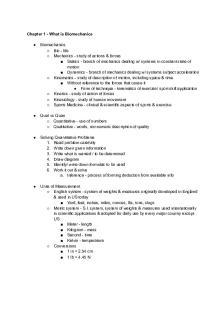Exam 1 Study Guide PDF

| Title | Exam 1 Study Guide |
|---|---|
| Author | Marcus Reyes |
| Course | General Psychology |
| Institution | University of Nevada, Las Vegas |
| Pages | 2 |
| File Size | 84.9 KB |
| File Type | |
| Total Downloads | 50 |
| Total Views | 199 |
Summary
Study Guide...
Description
Psychology 101- Spring 2016 Exam 1 Study Guide Consists of 80 questions o Multiple choice and 1 drawing from the powerpoints you will be asked to label o Possibly free response extra credit questions Chapter 1 (25% of the exam) Important names associated with the history of psychology o Who are they? What is their role in the evolution of psychology? Schools of psychology (e.g., behaviorists, humanists, etc.) Branches of psychology Definitions of psychology overtime Origin of the term psychology When did psychology become a science?
Chapter 2 (25% of the exam) Assumptions of the scientific approach Steps to scientific investigation What is a hypothesis? What is a theory? What are variables? What are independent and dependent variables? Correlational method o Know what correlations are o Know values of correlations Different types of research methods and their corresponding advantages and disadvantages/concerns Control vs. experimental groups Sample vs. population Replication studies Extraneous and confounding variables Chapter 3 (50% of the exam) Neuronal structure (possible picture) Neuroanatomy (possible picture) Function of neuron structures Function of glia cells Synaptic transmission Neurotransmitters o Levels for disorders such as schizophrenia and depression Afferent vs. efferent nerves Afferent = sending information into central nervous system Efferent = sending information out of the central nervous syste Nervous system o Divisions of the nervous system and their functions
Research and imaging methods associated with brain activity and structure Functions of the brain structures o For example, be able to answer questions asking about how damage to a particular region will look like (e.g., damage to the cerebellum results in coordination problems). There will be several questions inquiring about different brain structures. Split-brain studies and hemispheric specialization o Purpose and findings What are hormones and what comprises the endocrine system o Do not need to know specific hormones Heredity and environment research Parkinson’s and the brain...
Similar Free PDFs

Exam 1 Study Guide
- 1 Pages

exam 1 study guide
- 5 Pages

Exam 1 study guide
- 6 Pages

Exam 1 Study Guide
- 6 Pages

Exam 1 Study Guide
- 12 Pages

Study Guide Exam 1
- 9 Pages

EXAM 1 Study Guide
- 3 Pages

Exam 1 Study Guide
- 14 Pages

Exam 1 study guide
- 21 Pages

Exam 1 study guide
- 13 Pages

Study guide Exam 1
- 24 Pages

Exam 1 study guide
- 5 Pages

Exam 1 Study Guide
- 2 Pages

Exam 1 Study Guide
- 17 Pages

Exam 1 Study Guide
- 4 Pages

Exam 1 Study Guide
- 12 Pages
Popular Institutions
- Tinajero National High School - Annex
- Politeknik Caltex Riau
- Yokohama City University
- SGT University
- University of Al-Qadisiyah
- Divine Word College of Vigan
- Techniek College Rotterdam
- Universidade de Santiago
- Universiti Teknologi MARA Cawangan Johor Kampus Pasir Gudang
- Poltekkes Kemenkes Yogyakarta
- Baguio City National High School
- Colegio san marcos
- preparatoria uno
- Centro de Bachillerato Tecnológico Industrial y de Servicios No. 107
- Dalian Maritime University
- Quang Trung Secondary School
- Colegio Tecnológico en Informática
- Corporación Regional de Educación Superior
- Grupo CEDVA
- Dar Al Uloom University
- Centro de Estudios Preuniversitarios de la Universidad Nacional de Ingeniería
- 上智大学
- Aakash International School, Nuna Majara
- San Felipe Neri Catholic School
- Kang Chiao International School - New Taipei City
- Misamis Occidental National High School
- Institución Educativa Escuela Normal Juan Ladrilleros
- Kolehiyo ng Pantukan
- Batanes State College
- Instituto Continental
- Sekolah Menengah Kejuruan Kesehatan Kaltara (Tarakan)
- Colegio de La Inmaculada Concepcion - Cebu